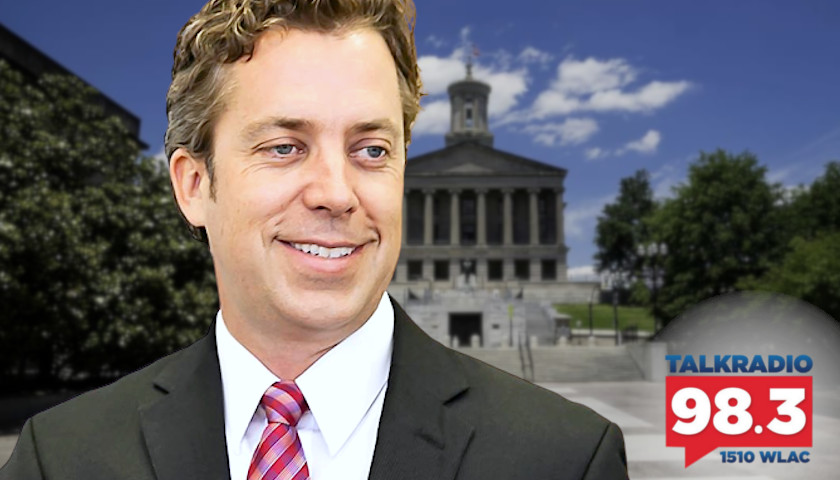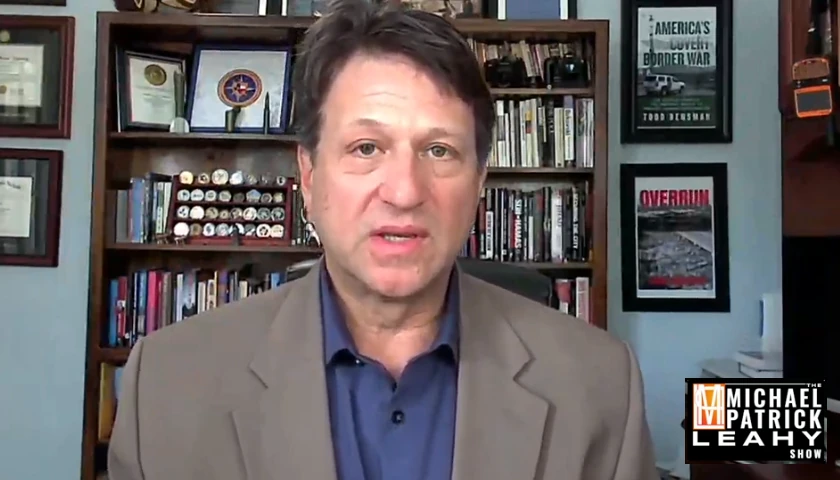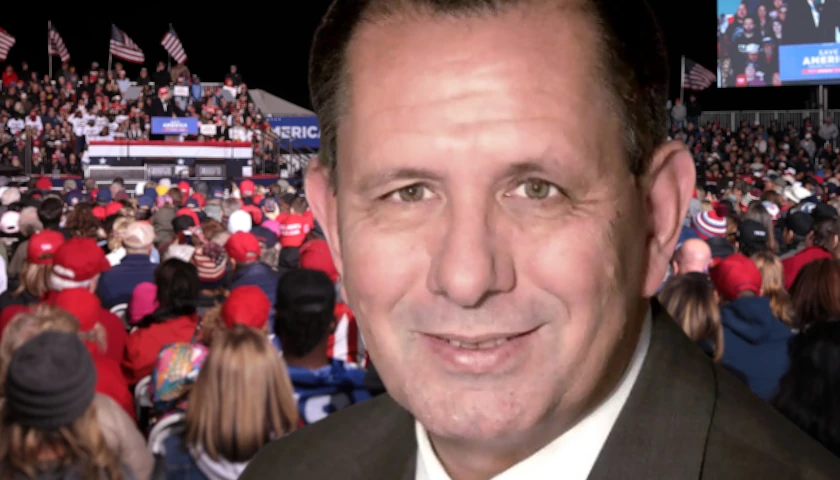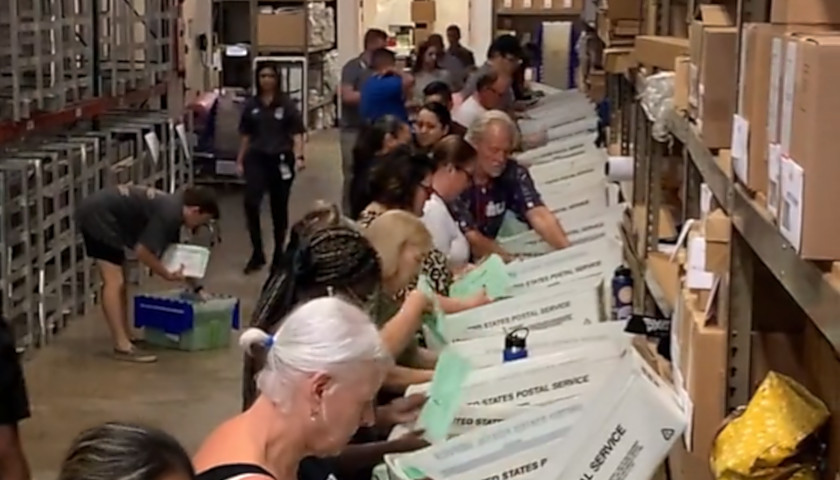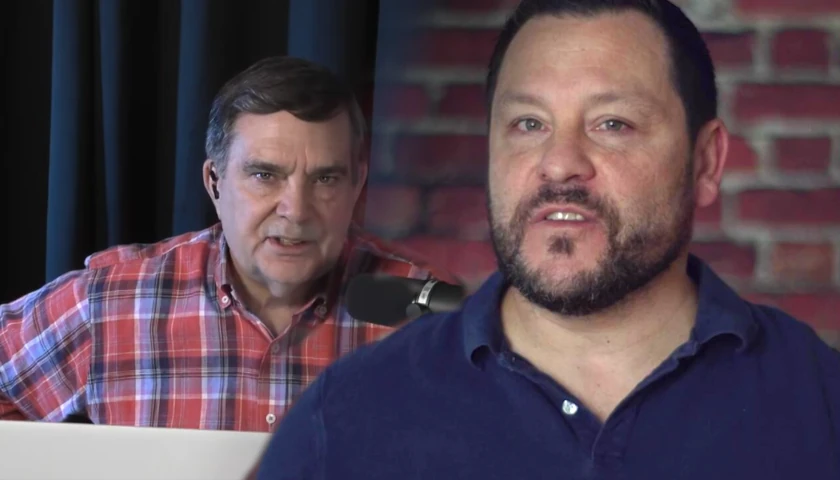Live from Music Row Tuesday morning on The Tennessee Star Report with Michael Patrick Leahy – broadcast on Nashville’s Talk Radio 98.3 and 1510 WLAC weekdays from 5:00 a.m. to 8:00 a.m. – host Leahy welcomed Maury County Mayor Andy Ogles in the studio to talk about the growth in his county and being accessible to the community and new California conservative refugees.
Leahy: In studio with us, our good friend, Maury County Mayor Andy Ogles. Andy, Maury County is experiencing huge growth. This is good. And this is problematic as well.
Ogles: Right.
Leahy: In the past month, I guess since you were here last, here’s what I’m noticing. I’m noticing, at least in Nashville and in Williamson County, maybe it’s the good weather, but I’m noticing that real estate houses are going very fast A. And B, I’m hearing from Realtors that the asking price is not what the closing cost is. That people are bidding these things up by five to 10 percent. At least that’s what I’m hearing in Nashville and in Williamson County. And the reason is California money. That’s what I’m hearing. What are you seeing in terms of growth in Maury County?
Ogles: Yeah. I mean, we’re growing. So when you think about Maury County, we have Spring Hill, Colombia, Culleoka, and Mount Pleasant. Those are kind of your larger areas.
Leahy: I am almost one of your constituents. Our mailing address is in Thompson Station. I live in the city of Spring Hill. And as you know, I think about a third of the city of Spring Hill is in Maury County and about two-thirds of it. I don’t know the exact numbers in Williamson County. So I’m just a couple of miles away from Maury County. Spring Hill is, in essence, sort of an extension of the Nashville suburbs.
Ogles: That’s right. And when you think about Maury County, you think about the growth. The Maury County side of Spring Hill in the last couple of years has actually been the part of Spring Hill that’s growing the fastest.
Leahy: And why is that?
Ogles: Well, there’s a couple of reasons. One is it’s a little bit cheaper to build a home in Maury County than it is Williamson County.
Leahy: Why is it cheaper to build a home in Maury County than Williamson County?
Ogles: So Williamson County has some impact fees that a builder has to pay that immediately is layered on top of the price of the home. So since the building a Maury County, for that reason alone, it’s a little bit cheaper. And then just supply of land. The Williamson County side grew first. You have greater density up there. Now the Maury County side of Spring Hill is growing. But that being said, now what you’re seeing is that the northside of the county is growing. The midsection of the county is growing.
Leahy: That midsection would be around Columbia.
Ogles: Columbia, the downtown area. But then also out in the country where I live the southern area. So there’s a road called Morrow Lane.
Leahy: I know it well, it’s just south of Columbia.
Ogles: That’s right. And there’s about I don’t know, seven or eight lots there. And all of those houses that are going up are in the 425 to 450 range, and those houses are selling before they’re even done.
Leahy: So it’s a hot real estate market there.
Ogles: It’s booming. And then I have a friend that was looking at a house there in Columbia and been on the market for a day, and they were scheduled to go see the house today and it’s already sold.
Leahy: I’ve heard that.
Ogles: With multiple offers.
Leahy: I’ve heard that story so many times here from friends that are looking for houses. And I do get a bit of how shall we say, I wish that California money would stay in California.
Ogles: Yeah right. Well, I will say that we’re seeing the same thing in Maury County that Williamson and Nashville are seeing folks from New Jersey, New York, California, Wisconsin, and a little bit out of Washington.
Leahy: Washington State.
Ogles: Yeah, but they’re refugees that they’re conservative refugees that are leaving the state for lack of a better term because they felt persecuted. But I’ve been rather outspoken. And so a lot of these folks will seek me out and say, hey, we’re California. I just want to say thank you or whatever, and I just feel like, okay, pause. Wait a minute. You left for a reason. Please don’t Californicate Maury County, Tennessee.
Leahy: Now how do they respond when you say please don’t Californicate Maury County?
Ogles: You can kind of self-deprecate, kind of make light of a situation, but they acknowledge the truth that yes, we know we left. Don’t hate us because we’re from California. Don’t hate us because we’re from New Jersey. We’re here because we agree with you. We agree with Tennessee.
Leahy: Well, now let me follow up with that. In theory they agree?
Ogles: They agree.
Leahy: Okay. Now Let’s get down to it is the next thing they say. Why don’t you have X, Y, or Z?
Ogles: Well back home this is how we do it. Well you left back home and you are in Tennessee now and it’s cheaper to live here because we don’t do it that way.
Leahy: Do you get a lot of that?
Ogles: Again, I think most people recognize that, especially like California. Yes, they have X, Y, and Z, but it’s not sustainable. It’s not working. You can’t continue to rob the taxpayer to fund these rainbow and unicorn programs and not realize that at some point you just run out of money. And that’s what our federal government has been doing.
Leahy: In the course of your typical week in Maury County, how many people do you run into that are new residents of Maury County?
Ogles: It’s a lot. I mean, it’s daily.
Leahy: Daily. Every day.
Ogles: I try it in the morning. I don’t get to do this every day, just kind of full disclosure. But I like to spend whether it’s a little bit of time in the morning or kind of during lunch, a little time on the square, just sitting outside. I’ll be on my phone, answering emails. But one, it’s just good to get some fresh air.
Leahy: So hold on. You are the mayor of Maury County. And so the way you hold sort of public hours, I suppose you could say is you sit on the square?
Ogles: Well, my office is on the square.
Leahy: It’s inside the big building, the inside the square.
Ogles: But I like to be accessible. So it’s not free time so much because I’m responding to emails or I’m on the phone, but I’m there.
Leahy: Is there, like, the mayor’s bench?
Ogles: (Chuckles) No.
Leahy: Where do you sit? How do people know that you’re the mayor of Maury County?
Ogles: Well, the coffee shop there is right next to my office. So I’ll sit out there on their bench.
Leahy: So you sit on the bench outside of the coffee shop?
Ogles: That’s right. Or outside of Puckett’s.
Leahy: Okay, so there you are in your smiling and answering emails, doing work. Do people come up and say, hey, mayor, what are you doing about X, Y, or Z?
Ogles: No. I mean, in Maury County, we’ve got a great County Commission. They’re not always going to agree with one another, but fiscally conservative trying to manage this growth without raising taxes. And we try to be proactive. So we’ve invested in things like our emergency services because, again, we’re growing so fast.
I would think, by and large, that most individuals in Maury County, like where we are and where we’re headed, with the exception of maybe some of the transplants that don’t quite get that you’re not going to have recycling services out in the rural part of the county. It’s just not feasible to do that. We do, however, have recycling centers that you can take it yourself, but we’re not going to come to pick it up.
Leahy: But how do people know that there’s the mayor hanging out on the bench by the coffee shop in the square?
Ogles: Well, because of The Tennessee Star. (Leahy laughs)
Leahy: But this is radio right? Do you put a sign the mayor is in? (Chuckles)
Ogles: No, not at all. Actually, it’s funny when you’re out there, it’s not my most productive time because I end up talking to people kind of back to back, but it’s good. That’s the part of the job that I love. I spent a lot of my time chained to a desk, answering emails on the phone, being an advocate for Maury County with the legislature with the governor’s office. So it’s nice to be out in the public and actually just have a conversation.
Leahy: So when was the last time you were out there on the bench by the coffee shop on the square?
Ogles: Yesterday morning.
Leahy: Describe one of the people that came up to you.
Ogles: One of my fun interactions was just an older gentleman, not someone you would assume was maybe in tune with what was going on was somewhat disheveled.
Leahy: Did he recognize you?
Ogles: He sat down and just said, I appreciate all you’re doing.
Leahy: That was it.
Ogles: He was just plain and as a matter of fact about it. And didn’t need anything, didn’t want anything.
Leahy: Oh, don’t you love those kinds of conversations? But you’re actually very good at dealing with people that are asking questions or want something. It’s different. Like doing a radio show, you just get to talk, and you don’t have to do anything. You just get to talk. You actually have to do stuff.
Listen to the full second hour here:
– – –
Tune in weekdays from 5:00 – 8:00 a.m. to the Tennessee Star Report with Michael Patrick Leahy on Talk Radio 98.3 FM WLAC 1510. Listen online at iHeart Radio.
